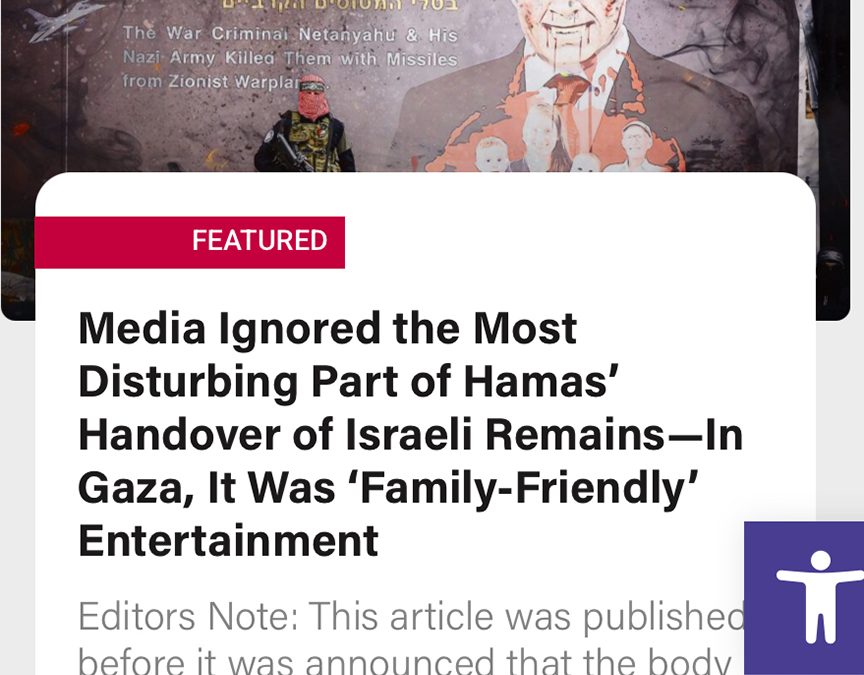Gathering of journalists explores how to achieve fair coverage

Courtesy Honest Reporting.
By Richard Friedman
From where I sat, I could see everyone’s face.
A small group of Birmingham journalists, media people and community activists were focused on the speaker. Gil Hoffman, a longtime writer for Israel’s Jerusalem Post and executive director of Honest Reporting, was seated next to me engaging the group in a thoughtful dialogue.
Hoffman, who lives in Israel, was in Birmingham for several events. My friend Barnett Wright, executive editor of the Birmingham Times, which covers the city of Birmingham with a focus on the African American community, and I invited the group to meet with Hoffman. Honest Reporting is an organization that monitors news coverage of Israel and strives to ensure that it is accurate and fair.
The group was varied, young and older, Black and white, traditional media and social media — all interested in the challenges of covering Israel and appearing to be open to understanding more clearly how inaccurate and inflammatory coverage of Israel has ignited a backlash against Jews worldwide.
As I introduced Hoffman to them and them to Hoffman, I stressed that Honest Reporting is not dedicated to seeking “favorable coverage” but rather fair coverage.
Fair coverage, for example, would be news stories that explain the rationale behind the actions Israel takes, puts events in context, and recognizes and reports on Israel’s unique and agonizing security dilemmas. Hoffman drilled down on these and other points.
He lamented that too often when conflict erupts in the Middle East and especially when it involves Israel — arguably the most over-covered country on the planet — that journalists are parachuted in with little background and historical context, no pre-existing source relationships, and insufficient language skills when it comes to understanding Hebrew and Arabic.
Moreover, he said, since the Hamas terror attack against Israel on October 7, 2023, many news outlets have been over-dependent on reporters and photographers in the Gaza Strip who are untrained and/or affiliated with Hamas. He referenced a story that reported that Israeli air attacks had killed 500 civilians in a hospital in Gaza when a subsequent investigation revealed that only 50 people died and the cause of death was a rocket misfired by the Islamic Jihad terrorist group, and the rocket hit the parking lot.
This superficial and at times biased coverage, Hoffman emphasized, has enabled Hamas to implement a pre-planned media strategy, anchored by creating no-win fighting predicaments for Israel that have led to civilian casualties, to turn public opinion against the Jewish state and Jewish people worldwide.
Media Literacy
Despite the daunting nature of the topic, it still was a heartening afternoon.
Solomon Crenshaw, one of Alabama’s most widely honored journalists, was deeply engaged with Hoffman before the program started. Crenshaw was garnering insights for a story on the gathering he planned to write for Birmingham Watch, a non-profit non-partisan news website.
Al.com’s Roy Johnson, a nationally known columnist and Pulitzer Prize finalist, was also there, scribbling in his notebook and listening intently as the conversation unfolded.
Olivia Ferriter, a former Birmingham News reporter, congressional aide and U.S. Interior Department official, and now a board member of Birmingham Watch, highlighted the need for greater “media literacy” and the importance of finding sources that are trustworthy.
Jarvis Escott, a former UAB student government president and host of the highly popular podcast “What’s Happening Birmingham,” and someone who has 100,000 followers on social media, advised, “You’ve got to reach the young people.” Escott has done three podcasts on Israel and antisemitism since the Oct. 7 attack.
The conversation with Hoffman lasted from 4:15 to 5:30 p.m. and could easily have gone on beyond that with everyone in the room asking good questions and sharing insights.
Those of us who live in a Jewish world too often feel as if everyone is against us, a feeling that has intensified since Oct. 7. The environment in the room this day contradicted that. It was a room filled with thoughtful people of good will simply dedicated to better understanding the issues and ferreting out the truth.
What made the gathering even more gratifying was working with the Birmingham Times’ Wright, my co-coordinator and one of Birmingham’s most distinguished journalists.
He and I have collaborated before, most notably on the creation of a joint student journalism internship between the Birmingham Times, Southern Jewish Life magazine and Miles College. Wright and the Birmingham Times are dedicated to promoting cooperation and understanding among all people and groups in Birmingham.
Wright called me the next morning. A big-framed man with a booming voice and a passionate heart, he had been deeply moved by the event. “Richard,” he said, “I thought the program was amazing. We have to do more things like this. We are going to walk the walk.”
An hour later, others who worked on the program and I got this text from Wright: “The energy in the room was so positive that I’ve yet to find ways to describe such an awesome gathering.”
Richard Friedman, retired executive director of The Birmingham Jewish Federation, is a former Birmingham News reporter and editor. He also taught journalism at Birmingham-Southern College.



